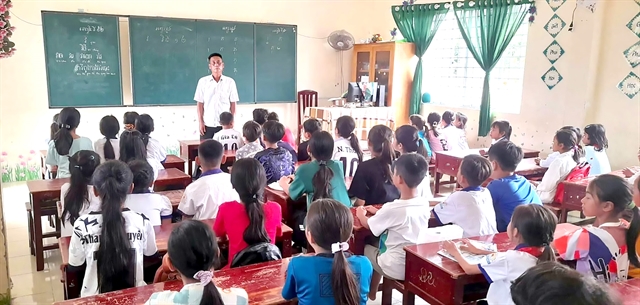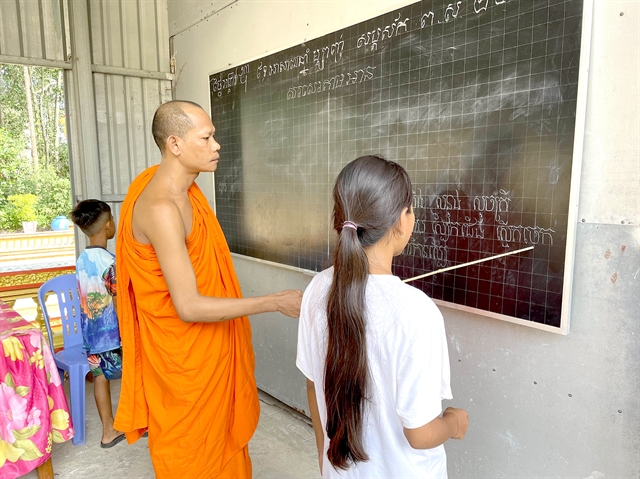 Society
Society

 |
| A Khmer language class at Tà Mum Pagoda in An Giang Province’s Đinh Hòa Commune during the ongoing summer holidays. — VNA/VNS Photo Lê Sen |
MEKONG DELTA — Many Khmer pagodas in the Cửu Long (Mekong) Delta are offering free Khmer language classes for schoolchildren during the summer holidays, playing a vital role in preserving the language and cultural identity.
In An Giang Province, Định Hòa Commune has a large ethnic Khmer population and several pagodas, including Tà Mum, Cà Nhung, Thanh Gia, Bần Bé, and Tổng Quản.
This summer, Tà Mum Pagoda has taken in nearly 200 students aged between five and 15, grouped them by age and teaches them either on its premises or at Pem Buôl Primary School.
The classes are taught by monks, Khmer teachers and elders.
At the end of the course, there will be tests and prizes for outstanding students.
Venerable Danh Minh Tuấn, the abbot of the pagoda, said the number of students has increased compared to previous years.
“For many years, these summer classes have helped Khmer children learn their mother tongue, both spoken and written, and introduced them to their cultural heritage, traditions, customs, and ways of addressing others in the community.”
Danh Út, a student at the pagoda, said: “This is the third year I have been coming to the pagoda with friends to learn Khmer.
I used to be able to read but couldn’t write. Now, I can write Khmer letters. The monks teach us with great dedication.”
Hundreds of students have been learning since early June.
The classes focus on basic listening, speaking, reading, and writing skills. Students are also taught moral values and Khmer traditions.
Chương Hoàng Tha, chairman of the Định Hòa Commune Fatherland Front Committee, said: “We work with the pagodas to encourage students to attend the classes, while also providing learning materials and small gifts.”
This not only keeps children away from video games and holiday-related risks but also helps preserve Khmer culture, he said.
Similar classes are also organised at many pagodas in Vĩnh Long Province every summer.
Âng Pagoda in Nguyệt Hóa Ward, the oldest Khmer pagoda in the former Trà Vinh Province (now part of Vĩnh Long), is hosting nearly 200 students this summer, who are divided into five classes based on proficiency levels.
Thạch Tô Sôvane Đara, a ninth-grade student at the Châu Thành Ethnic Boarding School in Châu Thành Commune, is attending classes at Âng Pagoda for the second year.
“I’m very happy and proud to learn the language and script of my people,” he said.
“I hope to inspire others in the community to study Khmer.
“Previously, I studied Khmer for five years at Samrong Ek Pagoda in Nguyệt Hóa Ward. The monks were very dedicated, explained things clearly, and always created a friendly and cheerful learning environment. I’ll keep learning until I can speak, read and write Khmer fluently.”
 |
| Children learn Khmer at Âng Pagoda in Vĩnh Long Province’s Nguyệt Hóa Ward during the summer holidays every year. – VNA/VNS Photo Thanh Hòa |
Thạch Thị Thu Hà, director of the Vĩnh Long Province Department of Ethnic and Religious Affairs, said: “There are 156 Khmer Theravāda pagodas in the province, most of which offer Khmer classes during the summer.”
In Cần Thơ, Khmer pagodas are not only places of worship but also play a vital role in preserving the cultural identity and teaching the language to younger generations by running free summer classes.
In the former Sóc Trăng Province (now part of Cần Thơ), there are nearly 100 Khmer pagodas.
The language classes have become a familiar activity in these pagodas during the summer holidays, attracting large numbers of children.
This year, Pô Thi Sal Chrôi Tưm Kan Đal Pagoda in the former Đại Tâm Commune of Mỹ Xuyên District (now Mỹ Xuyên Ward in Cần Thơ City) has two classes for more than 100 pupils in grades one and two.
Before the courses began, the pagoda, with assistance from local socio–political organisations, provided the students with pens, notebooks and textbooks.
Many pagodas have called on Buddhists and other donors to provide uniforms, bicycles and study materials and organise recreational activities to motivate and support the students. — VNS




